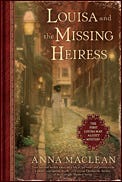Louisa and the Missing Heiress launches a cozy mystery series featuring the author of Little Women as sleuth. From childhood, Louisa May Alcott led a remarkable life. Her father was an abolitionist, a vegetarian, and a Transcendentalist. The family home sometimes served as a station for runaway slaves traveling to freedom in Canada. Educated mostly at home by her father, Alcott also studied under family friends Ralph Waldo Emerson, Henry David Thoreau, Nathaniel Hawthorne and Margaret Fuller. The family lived in genteel poverty in Concord, Massachusetts, where Alcott worked at various jobs, from domestic servant to teacher, before succeeding as a writer.
In Louisa and the Missing Heiress, Louisa is twenty-two, living at home with her parents and sisters, and struggling with the first draft of a "blood and thunder" story quite different from her soon-to-be-published collection of children's stories, The Flower Fables. When the body of her wealthy friend Dot is fished out of the river in Concord's seedy wharf district, Louisa is shocked by the apparent callousness of Dot's husband and family. And when she realizes Dot's death was no accident, her sense of responsibility and penchant for adventure drive her to investigate.
One of the pleasures of this novel is the well-drawn portrait of the young Louisa May Alcott, who loves her family and uncomplainingly pitches in with her share of domestic tasks even as her feminist spirit chafes against the restrictions and injustices her society imposes on women. Some readers may grow impatient with the slow pace of the not-too-baffling mystery plot, but there is rare charm in such scenes as a washday conversation while Louisa cuts off "the buttons from all of my father's shirts. They would have to be removed so they wouldn't break in the washing; buttons were expensive. After the ironing, they would all have to be sewn back in place." (2004; 310 pages)




